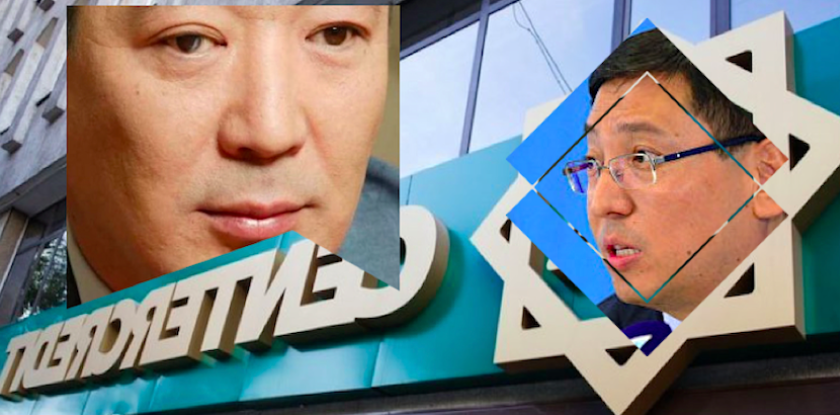As we predicted at the beginning of April, Bank CenterCredit JSC (BCC) may become the National Bank’s next victim as part of the latter’s operation of reforming/rescuing the banking sector of the country. The events of the last two months confirm that this is quite feasible. Especially considering the on-going high-profile scandal involving the bank.
We are talking about a rather strange case of loan-provision. As far as we can remember, there have been no precedent like this in the past.
You can find a more detailed information on the subject in our publications of May 16, 2019 How CenterCredit Conned a Borrower and of May 29, 2019 New Names in the BCC Scandal.
However, the comments to these articles left on our web-portal contain infinitely more information. The information that is sensitive (and unknown to us) at that. Judging by the quantity of the posts, their content and the sharpness of the discussion, both interested parties have taken part in it without trying to hide their emotions and aggression.
Having analyzed this case, we have arrived at the conclusions that are, in our opinion, quite important to foreign investors and to casual observers who got interested in Kazakhstan when the First President Nursultan Nazarbayev handed his post over to Kasym-Zhomart Tokayev.
First conclusion: the process of the initial accumulation of capital in Kazakhstan is nowhere near its end. And as for the nation-wide law-obedience and developed civil consciousness, most Kazakhs must still travel too long a way to obtain it.
Second conclusion: the corporate practices in Kazakhstan differ cardinally from the ones in the West and the ones recorded in the official documents. In a nutshell, it’s like this: “the one who has more rights is in the right”. And, what is crucial for the country is that it does not go against the mentality of most Kazakhs, therefore, is being routinely practiced not only by the business but in the field of domestic policy, state governance, social sphere and even intrafamilial relationships.
For this reason, any Kazakh entrepreneur must operate in an extremely complex environment where what matters is not only his own actions, entrepreneurial spirit and law-obedience but also such factors as who his competitors and partners are, what connections he and these people have in the state apparatus, the business community and the society, which state agencies they may use, what the relationships are like between the officials and the entrepreneurs that, one way or another, may have a voice in the matter. And so on, and so forth.
Obviously, foreign investors, especially those from the states where the level of political and economic corruption is low while the belief in the rule of law and the possibility to defend one’s interests in court does exist, find it very difficult to operate in Kazakhstan. All the more so since the possibility to resolve a conflict via the legal means (in courts and in full compliance with the law) is practically nil.
Let us confirm our conclusions by recalling the details of the scandal involving BCC top-managers.
According to our insiders, the bank is currently conducting meetings with the Board members and the other parties involved in this high-profile case. The decisions made at these meetings are first presented to BCC’s majority shareholder Bakhytbek Bayseitov who then approves them.
These are the decisions that have allegedly been made at these meetings.
- To successfully insist on opening criminal investigations against Bakzhan Kulbayev whom they regard as their key opponent. By the way, according to the information we have received, he is currently out of Kazakhstan, but in the case he risks returning to the country, he will be faced with great difficulties perhaps even an arrest.
- To forcibly bankrupt Flamma LLP, the owner of Dutch company Saigak Kazakhstan B.V., the operator of the Temir oil field (Aktobe region). According to our insiders, some special measures have already been taken to make the arbitration court take the side of the lender.
- To put the power pressure on the opponents including the employment of criminal groups. Particularly, we are talking about a widely known in narrow circles crime boss called “Socrates” (currently resides in Moscow).
- To militate against Bekzhan Kulbayev and his partners who are trying to seek justice in the law-enforcement structures of the country bombarding them with complaints. According to our insiders, all these complaints will be reviewed without any consequences for BCC’s employees and the other parties involved (we will not go into the causes of that).
Let us underscore once again: we are not trying to say that, in this conflict, Bekzhan Kulbayev is right on every account while his opponents are completely wrong. The problem in this case lies in something else: that a big business (BCC) has a clear advantage over a medium-sized business (Kulbayev and his partners) and that it is exploiting this advantage to the fullest.
With that, Kulbayev’s hopes that his friends and acquaintances in the oil-and-gas sector will be able to help him may turn out to be futile. According to the insiders, Bakhytbek Bayseitov has already spoken about this with Daniyar Abulgazin and perhaps managed to reach some kind of an agreement with the latter.
Bekzhan Kulbayev and his partners are not aware of the fact that their opponents have decided to take control over the Temir oil field (Aktobe region) not only for the purpose of thus repaying the loan provided by the bank. Something else is at play here: the thing is that, in Kazakhstan, the banking business has seized to be profitable. Apart from that, the market and the non-market risks have risen as well. It only takes Akorda’s decision to eliminate a bank or orchestrate a massive outflow of a bank’s clients in order to sink the financial institute. The unfortunate fate of Tsesnabank JSC and its key shareholders (the Dzhaksybekov family) may serve as a vivid example of it.
It is for this reason that Bakhytbek Bayseitov and a large group of the affiliated parties have decided to launch their business in the other sectors (in the oil-and-gas sector and some others). We are talking about creating a relatively big company for developing the modest-sized fields. The key role in this project belongs to certain Erbol Tokkozhin.
According to our insiders, they are also planning to develop the Ravninnoye field (Atyrau region) where Kor-Tazh Munai LLP is the user of subsurface resources. Allegedly, Bakitzhan Zhulamanov, the current Chairman of Samruk-Enero JSC, is its end owner while Tokkozhin is listed as one of the shareholders.
According to our insiders, US$ 50 mln have already been spent on the exploration of the field, however, the results so far do not exceed the expectations and, most importantly, are insufficient for putting them onto the books as the experimental and commercial development. In view of this, the project needs additional investments that can be obtained from the banks including BCC JSC.
Therefore, we will not be too surprised to learn that a part of the funds received by the bank as a result of the additional $100 mln bond placement will be spent on creating a new business with the participation of Bakhytbek Bayseitov and his partners (this time, in the oil-and-gas sector).
We believe the conflict between BCC and Bekzhan Kulbayev, even though the former is dominating it and looks much stronger than its opponents, is not to end soon (say in a few months). Moreover, it looks like more and more parties are going to get involved. And then, it is not only and not so much the fact of how strong they are but of how vulnerable they are that will matter.
In this sense, Mr. Kulbayev has nothing to lose, apart from his assets, while Bank CenterCredit may lose the trust of the market and the clients. And, on top of it, it may overexert the authorities including the National Bank that has no use of the talks about the lender’s asset-grabbing and its managers’ fraudulent acts.





